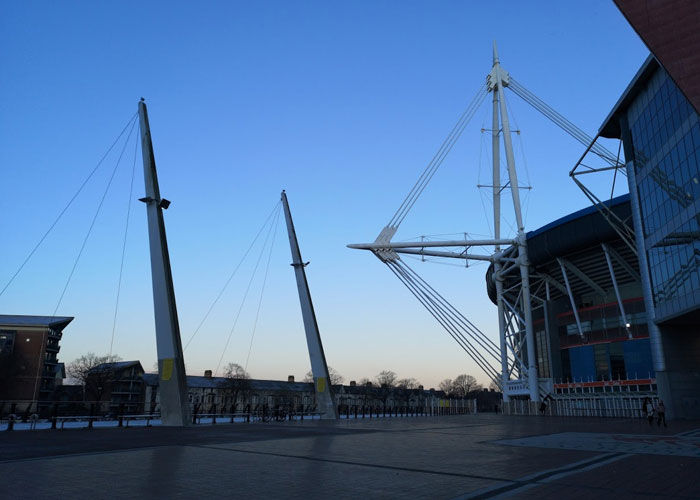Business leaders, politicians & motorists express disappointment at M4 relief road cancellation

Earlier this week, First Minister Mark Drakeford announced that plans to build a relief road to ease congestion on the M4 were to be scrapped. The plans for a 14-mile motorway would have created a gateway into south Wales, tackling current congestion issues faced by motorists around Newport.
The Minister said both the cost, and potential environmental damage to the Gwent flats were driving issues in the decision, despite it breaking a manifesto pledge.
Announcing the decision, Mr Drakeford said there were “no easy answers” to the issue of congestion on the M4 and promised to set up a new “expert commission” to look at alternative solutions to solving traffic problems on the M4 around Newport, as well as plans to implement “a series of fast-tracked” measures “to alleviate congestion on the M4 in south Wales”, including enhanced traffic officer patrols and live journey time information.
While Friends of the Earth welcomed the news, saying it was “great news for Wales and the planet”, many welsh motorists are unhappy both at the decision to cancel the project and the funds, £114M, which have already been spent in reaching this point.
Newport West Labour AM Jayne Bryant said
“the decision condemns Newport to further decades of heavy congestion, idling traffic and toxic fumes”.
Robert Lloyd Griffiths, Director IoD Wales said:
“This is desperately disappointing. Congestion is holding us back and is also deterring investors from considering us as viable traders. We firmly believe the Black Route is the best option for the most impactful and integrated transport option to best benefit Wales’ economy.
“For the business leaders I speak to day in, day out, the message on improving the M4 was clear: get it done and get it done quickly. We now know this is not going to happen. The lingering and procrastinating has done nothing for Wales’ reputation and the more economically and environmentally viable option which have been debated should have been thoroughly considered and presented today.
“The perennial issue of a relief road featured prominently in our Ten Point Plan for the Economy, which we presented before the last Welsh General Election, with its potential to dramatically and positively impact transport links for the Wales economy.
“We have conducted various surveys among our members for some time now, which have revealed that the M4 and major road links to north Wales still need to be drastically improved at busy junctions – congestion must be relieved and accident figures reduced. This is a dark day for the economy of Wales.”
CBI Wales. Its director Ian Price added:
“No problem has been solved today. Congestion and road pollution around Newport can only increase. Economic growth will be stifled, confidence in the region will weaken and the cost of an eventual relief road will rise.”
Heather Myers, CEO, South and Mid Wales Chamber of Commerce and Harry Lloyd-Davies, President of the South and Mid Wales Chamber of Commerce said in a joint statement:
“The South and Mid Wales Chamber of Commerce, along with the entire business community that we represent, is bitterly disappointed with today’s news.
“With the decision not to build the relief road and, currently, no alternative solution proposed to help alleviate the congestion along this stretch of the M4, we are again left in limbo. Businesses who move their goods around and people who travel to work along the motorway will face years more of chaos, hindering economic growth.
“Opposition to the M4 relief road has always been centred around the argument that there are cheaper, more environmentally friendly solutions to the recognised problem, but we are astonished that these alternative solutions have not been put forward today.
“The South and Mid Wales Chamber of Commerce will be keeping pressure on the Welsh Government to come up with a solution, so that future generations of commuters, tourists, delivery drivers, and people just trying to get across the country aren’t left in traffic jams around Newport for decades to come.”
The Cardiff Capital Region (CCR) Regional Cabinet Chair Councillor Andrew Morgan said:
“The Regional Cabinet recognises that this has been an extremely difficult decision for the Welsh Government.
“It also recognises that business groups who campaigned for this road will be disappointed.
“The Regional Cabinet welcomes the creation of a commission to advise on what M4 improvements should now take place.
“The region needs an urgent package of evidence-based interventions, along with substantial public transport investment, which will create a clean growth mobility infrastructure for South-East Wales.
“Public transport investment addresses a number of fundamental needs and solutions for our region: improved mobility, clean growth, improved economic performance, and better social inclusivity.
“That is why the £734million South Wales Metro is at the cornerstone of the £1.22billion CCR City Deal.
“It is a major project, and its positive effects will be felt quickly. But in the absence of an M4 relief road, we need to see it supported with further investment and associated transport enhancements, including potential projects such as Metro 2 and Metro 3.
“Our key aims are to build a sustainable and resilient region, aligned to the principles of the Well-Being of Future Generations Act.
“The CCR wants to work closely with Welsh Government to co-deliver significant programmes of shared strategic importance.
“The Regional Cabinet would therefore welcome the opportunity to work with the Welsh Government to advance a fit-for-future infrastructure plan for the region which will no longer include the relief road.”
CCR EGP Chair Frank Holmes and CCR Business Council Chair Neil Brierley said:
“We are extremely disappointed by the decision to not proceed with a M4 relief road around Newport, and we must now work to adopt alternative infrastructure and technologies to ensure South Wales keeps moving.
This new road was critical in supporting and enabling the economic and industrial strategy for growth for South-East Wales, along with adjacent regions in Wales.
We fear that without it, South-East Wales – one of the fastest growing in the UK – will become paralyzed by an ageing transport infrastructure operating beyond capacity.
We welcome the £734m investment in the South Wales Metro, but the Metro can only do so much and is not going to resolve all our transport ills, certainly not in fully accommodating the transport of heavy goods. It needs to be delivered within the context of a wider plan.
Connectivity through clean growth and future mobility is a key component of our Economic and Industrial Growth Plan for the region.”
Frank Holmes added:
“The Cardiff Capital Region must now champion a determined commitment to seek a positive way forward by adopting alternative transport infrastructure and communication technologies to ensure business and access to South Wales remain open, and it does so for the wider benefit of enterprise throughout Wales.
“A sustainable and fit-for-future mobility system through private sector investment and delivery is something that won’t just get the region moving, but something which in itself could be a competitive edge.”
Neil Brierley said:
“We need to ensure the Cardiff Capital Region remains economically competitive with the rest of the UK, and that means ensuring we have transport routes which allow effective flow of goods and movement of labour.
“Failure to remain economically competitive will mean we will be simply unable to resolve the historical economic and social issues we are trying to address through a cohesive economic growth plan for the future prosperity of all. It is imperative that a series of alternative infrastructure interventions are developed, in conjunction with the South Wales Metro, to deliver the badly needed improvements to our transport network.”





